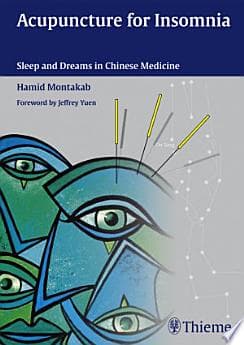- Published on
Acupuncture for Insomnia
- Authors

- Name
- Hamid Montakab
- @search?q=Hamid Montakab

Summary of "Acupuncture for Insomnia: Sleep and Dreams in Chinese Medicine" by Hamid D. Montakab
Introduction
- Topic: Acupuncture's role in treating insomnia, incorporating Classical Chinese Medicine (CCM) principles.
- Context: Insomnia affects 30%-40% of the population. Standard treatments often rely on medication, which can lead to dependency and overlook long-term health risks.
Main Concepts
Sleep Disorders and Chinese Medicine:
- Sleep reflects internal physiology in Chinese medicine.
- Sleep disorders indicate an imbalance in the body's internal equilibrium, particularly concerning the Five Substances and Zang-fu organs.
Insomnia Types:
- Differentiated into primary, secondary, acute, and chronic insomnia.
- Primary insomnia isn't caused by other conditions, whereas secondary insomnia is.
- Acute insomnia is short-term, whereas chronic insomnia lasts longer and occurs frequently.
Chinese Medicine Approach:
- Focuses on the Eight Extraordinary Channels, crucial for adapting to changes and maintaining internal balance.
- Emphasizes individualized treatment rather than standard point combinations.
- Integrates Western neurohumoral theories with Chinese concepts for a comprehensive understanding of sleep.
Treatment of Insomnia with Acupuncture:
- Effectiveness of acupuncture in treating insomnia.
- Importance of diagnosing insomnia based on CCM principles for more effective treatment.
- The treatment approach involves personalized acupuncture based on the diagnosis of Extraordinary Channels.
Conclusion
- Acupuncture, when aligned with Classical Chinese Medicine principles, offers a holistic and effective approach to treating insomnia.
- This approach is more personalized and can potentially reduce the dependency on pharmaceuticals for treating sleep disorders.
